5 Everlaw Competitors That Help Legal Teams Work Smarter
5 Everlaw Competitors That Help Legal Teams Work Smarter
eDiscovery software is no longer optional. Now, it’s the foundation for how modern law firms manage litigation.
Tools like Everlaw have gained a strong foothold in the legal tech space by offering advanced features for reviewing, organizing, and analyzing case data. But as useful as Everlaw is, it’s not always the perfect match for every team.
Some firms need more flexibility. Others want something simpler, more affordable, or easier to train on. That’s why many legal professionals are now looking at Everlaw competitors: platforms that deliver similar value but in ways that better fit their needs.
Let’s take a look at some of the best ones.
What is Everlaw?
Everlaw is an eDiscovery and litigation software designed to help legal professionals manage the complex process of handling electronic data during lawsuits, investigations, and regulatory matters.
For many attorneys, the challenge isn’t just the volume of documents but finding the relevant information quickly enough to support their case.
Everlaw addresses this by giving teams organized tools for data management, document review, and case preparation, all in one secure platform.
Source: G2
Litigation often involves millions of files ranging from emails to spreadsheets. Without the right system, reviewing this data can consume hours of valuable time.
Everlaw makes the process more manageable with advanced search tools, tagging features, and collaborative review. This usually helps attorneys complete due diligence faster and more reliably.
And because it’s cloud-based, attorneys can access and share information securely, even when working across different offices.
Key Features
- Advanced document review: Attorneys can filter, search, and tag documents at scale, which helps them identify relevant information faster.
- Data management: Handles large sets of electronic data while keeping files organized and easy to access.
- E-discovery workflow: Provides end-to-end support for the eDiscovery process, from document collection through review and production.
- Collaboration tools: Legal professionals can share notes, comments, and highlights within the system.
- Story-building and timelines: Helps teams connect evidence to case strategy, improving how arguments are presented.
- Secure cloud platform: Meets strict security standards while allowing remote access across different devices.
Why You Might Want an Alternative to Everlaw
Everlaw is respected in the litigation and eDiscovery space, but it may not fit every situation. Different law firms and corporate legal teams have unique needs when it comes to data processing, regulatory compliance, network security, and much more.
While Everlaw offers a strong set of tools, many attorneys and legal departments look for alternative solutions that better match their workflows, budgets, and case requirements.
Here are some common reasons professionals consider Everlaw competitors:
- Cost concerns: Many law firms need scalable pricing options that align with smaller cases or limited budgets.
- Complexity of features: Advanced technology is valuable, but teams with lighter caseloads may prefer simpler solutions with a shorter learning curve.
- Scalability issues: Not all firms handle massive document sets, so paying for enterprise-level tools isn’t always practical.
- Regulatory compliance: Some organizations require platforms with specialized compliance certifications or region-specific hosting.
- Data processing flexibility: Alternatives may offer faster or more customizable workflows for ingesting and reviewing electronic data.
- Support and training: Personalized onboarding and responsive customer service can be deciding factors for firms with limited tech staff.
- Network security options: Some competitors provide additional hosting or security controls beyond Everlaw’s cloud-only model.
If your firm wants an alternative to expensive eDiscovery solutions, Briefpoint’s Autodoc offers a smarter path forward.
It automates the creation of discovery documents and litigation drafts directly from reviewed data. However, you don’t get the steep costs or complexity of traditional platforms.
5 Top Competitors of Everlaw
If Everlaw feels like more than what your team needs, you’re not alone. Many law firms look at other options that make eDiscovery and litigation solutions easier to manage, and a few competitors stand out as strong alternatives:
1. RelativityOne
RelativityOne is one of the most widely recognized eDiscovery platforms in the legal industry. It’s used by top law firms and corporations that need reliable tools for managing large-scale litigation and investigations.
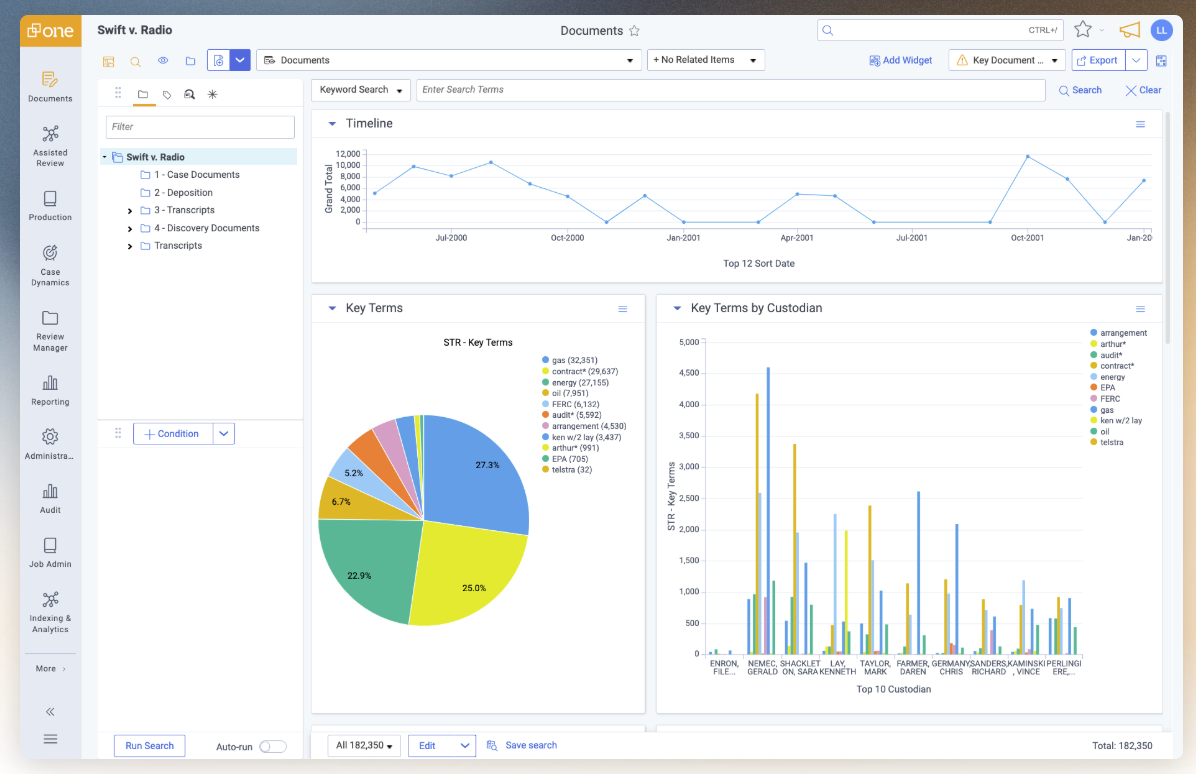
Source: Relativity.com
Known for its ability to handle massive data sets, RelativityOne offers flexibility for teams that must review, search, and produce documents under tight deadlines.
The platform also supports information governance and compliance, which makes it valuable for organizations that deal with sensitive or regulated data.
With its strong infrastructure and advanced features, RelativityOne has become a go-to choice for teams needing a complete system that covers everything from early case assessment to final production.
Best Features
- Early case assessment: Helps attorneys quickly filter large data sets to focus only on the most relevant information before moving deeper into review.
- Artificial intelligence: Uses predictive coding and machine learning to speed up document categorization and review.
- Information governance: Offers tools for monitoring, securing, and organizing data across departments and cases.
- Flexible document production: Built-in features simplify how teams prepare and produce documents for litigation or regulatory matters.
- Global scalability: Designed for corporations and firms handling cases across multiple regions and jurisdictions.
2. Nextpoint
Nextpoint is a cloud-based software built for eDiscovery and trial preparation, designed to support law firms, corporations, and even government agencies that want a more affordable option than larger enterprise systems.
Unlike many complex tools, it aims to give attorneys practical case management features without overloading them with unnecessary steps.
Source: G2
One of the standout parts of Nextpoint is its “digital warroom,” where legal teams can organize exhibits, depositions, and evidence for hearings or trials. This makes it easier to shift from discovery into actual case presentation, a step often overlooked by other platforms.
Nextpoint is frequently mentioned among Everlaw alternatives because of its flexible pricing and approachable design. While it may not have every advanced feature that large-scale systems offer, it delivers the essentials in a way that’s easy to adopt.
Best Features
- Digital warroom: Provides a dedicated space for organizing exhibits, depositions, and trial evidence so attorneys can move smoothly from review to case presentation.
- Cloud-based software: Ensures secure access to documents from any location, which is especially valuable for distributed teams and remote collaboration.
- Affordable pricing models: Offers subscription plans that fit the budgets of small and mid-sized firms without sacrificing core functionality.
- Simple uploads and reviews: Allows fast data processing with drag-and-drop tools, making it easy to start new matters quickly.
- Case management tools: Combines discovery and trial preparation features to give attorneys a single platform for handling the full litigation process.
3. DISCO Ediscovery
DISCO Ediscovery is a modern litigation platform designed to simplify how attorneys and corporate teams handle document review.
Positioned as one of the strongest Everlaw competitors, it focuses on speed, automation, and a user-friendly design that appeals to firms of all sizes.
Source: G2
When clients and legal teams need to analyze large volumes of data quickly, DISCO provides a clear advantage by reducing the time spent on manual review.
How Everlaw compares to DISCO often comes down to usability. While Everlaw has a broad set of features, DISCO emphasizes a faster learning curve and automated tools that assist attorneys in organizing and reviewing evidence.
Overall, it has built a reputation in the market as a platform that balances advanced capabilities with practical design, which is why many other users highlight it as an accessible alternative.
Best Features
- Fast data analysis: Built to analyze and filter massive data sets quickly to make reviews less time-consuming.
- AI-assisted review: Uses automation to categorize, tag, and prioritize documents, which helps focus on the most important files.
- Transparent pricing: Offers clear cost structures that make budget evaluation simpler for law firms and corporate teams.
- Client-focused tools: Designed to help attorneys collaborate with clients and colleagues during review and production.
- Free demo available: Firms can test the platform before committing, so they have a chance to compare features against Everlaw and other alternatives.
4. Logikcull
Logikcull is a self-service eDiscovery platform built to help law firms, business teams, and government organizations manage discovery without heavy IT involvement.
It has become one of the more popular Everlaw alternatives because it combines automation with affordability, which can give attorneys an efficient way to handle cases from start to finish.
Source: G2
Logikcull is typically used for smaller matters where teams want a fast way to upload data, apply filters, and prepare documents for review or production. Its design focuses on reducing the risks of manual handling by automating repetitive steps.
This makes it useful for firms or in-house counsel who need a straightforward solution to serve both litigation and compliance needs.
Best Features
- Automated uploads: Users can drag and drop files directly into the system, which speeds up the start of any project.
- Smart filtering and analytics: Built-in analytics help teams quickly find relevant material while cutting down on unnecessary review.
- Legal hold requests: Provides tools for issuing and tracking a request to preserve data to help protect against evidence loss.
- Cost control features: Offers predictable pricing and keeps details transparent, so firms avoid billing surprises.
- Data security and protection: Designed to safeguard sensitive information while meeting the compliance needs of both firms and businesses.
5. Nuix Neo Discover
Nuix Neo Discover takes a different approach compared to many of the other Everlaw competitors.
Instead of being designed only for law firms, it has its roots in digital forensics and compliance, which makes it a strong option for government investigations and regulated industries.
This background gives it a unique appeal for teams that need more than simple document review; they need a tool that can process complicated data and keep up with strict oversight requirements.
Source: G2
Unlike other cloud solutions for law firms, Nuix offers both cloud and on-premise deployment. That flexibility is important for organizations that prefer to keep sensitive data within their own infrastructure. It also means firms with specific security policies aren’t locked into one way of working.
While Nuix may require more training than lighter tools, the trade-off is a system that can handle massive volumes of material, manage compliance, and support litigation projects with forensic-level precision.
Best Features
- Deployment flexibility: Choose between cloud hosting and on-premise systems depending on security and compliance requirements.
- Forensic-grade processing: Handles diverse file formats, making it suitable for investigations and complex litigation.
- Advanced search tools: Powerful filtering and searching across emails, chats, and structured or unstructured data.
- Compliance support: Designed to meet standards for regulated industries and government oversight.
- Case-ready output: Prepares material efficiently for review, analysis, and submitting evidence.
Replace Expensive eDiscovery Solutions with Briefpoint’s Autodoc
Choosing between Everlaw competitors often comes down to what your team values most, which might include scalability, pricing, compliance, or usability.
Each of the solutions above helps legal professionals make sense of overwhelming volumes of data. But once that data is reviewed and evidence is ready, the real work of litigation continues: drafting discovery responses, motions, and pleadings.
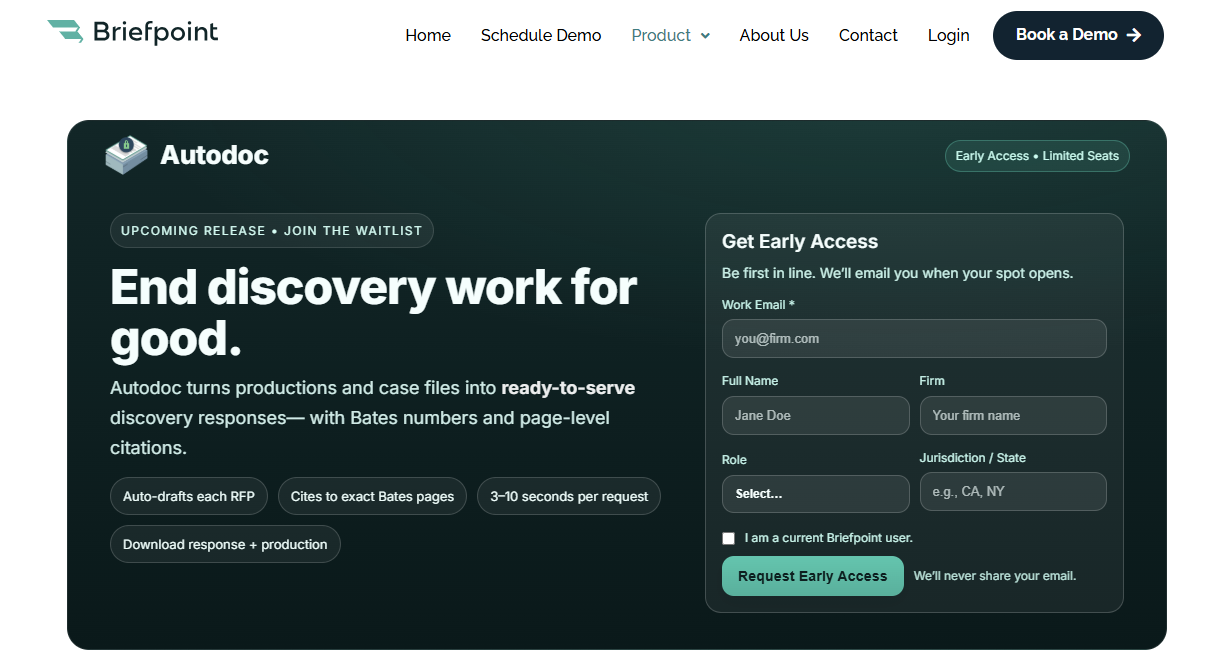
Many attorneys still spend hours repeating the same steps across different cases, and it takes away from the time that could be spent on higher-value work.
Briefpoint bridges that space. It doesn’t replace your eDiscovery platform but works alongside it. After documents are processed and reviewed, Briefpoint and its Autodoc technology can transform that information into fully drafted litigation documents in minutes.
Want to learn more? Book a demo with Briefpoint today to see how it works alongside your eDiscovery tools!
FAQs About Everlaw Competitors
What is the market share of Everlaw?
Everlaw has seen steady growth in the eDiscovery market, particularly among law firms and government agencies, though its exact market share isn’t publicly disclosed.
Is Everlaw a unicorn?
Yes. Everlaw reached unicorn status after securing funding that placed its valuation above $1 billion.
Is Everlaw a good company?
Many users rate Everlaw highly for its document review tools and user experience, though some law firms cite pricing and complexity as concerns.
How do legal teams manage document review more efficiently?
Most legal teams rely on eDiscovery software with built-in automation to make document review faster and reduce human error during data processing.
Why does data processing matter for law firms?
Law firms often handle large volumes of case files. Strong data processing tools help them sort, filter, and prepare documents without wasting time or money on manual work.
The information provided on this website does not, and is not intended to, constitute legal advice; instead, all information, content, and materials available on this site are for general informational purposes only. Information on this website may not constitute the most up-to-date legal or other information.
This website contains links to other third-party websites. Such links are only for the convenience of the reader, user or browser. Readers of this website should contact their attorney to obtain advice with respect to any particular legal matter. No reader, user, or browser of this site should act or refrain from acting on the basis of information on this site without first seeking legal advice from counsel in the relevant jurisdiction. Only your individual attorney can provide assurances that the information contained herein – and your interpretation of it – is applicable or appropriate to your particular situation. Use of, and access to, this website or any of the links or resources contained within the site do not create an attorney-client relationship between the reader, user, or browser and website authors, contributors, contributing law firms, or committee members and their respective employers.